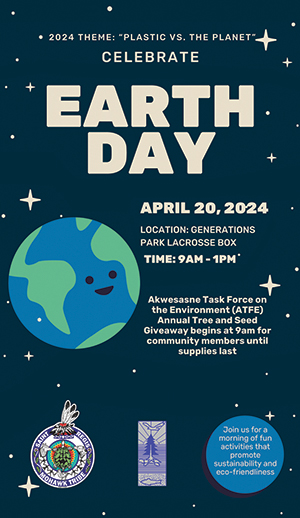First Nations speak out against trucker convoy
Blockades and protests rock Canada’s capital, border
By Miles Morrisseau. Special to Indian Country Today.
The smell of burning diesel and the rumble of semi-trucks have become all-too familiar in Canada’s capital city of Ottawa, as truckers and protesters continue to create blockades around Parliament Hill and along the border with the United States.
Hundreds of truckers – dubbed the Freedom Convoy – arrived in Ottawa, Ontario, in the middle of a brutal winter weekend on Jan. 29 to protest Canada’s vaccine mandates and other COVID-19 restrictions.
And a core group remained on Friday, Feb. 4, in Ottawa and 2,000 miles to the west in Coutts, Alberta, where truckers blocked the longest undefended border in the world. They have sparked support and copycat convoys, creating blockades across Canada and around the world. The cause became so popular that its GoFundMe campaign exceeded $8 million before being shut down.
It has now become a hostage drama of sorts in which the demands have spiraled out of control. As the occupation of the nation’s capital enters its second week and the blockade of the Canada/U.S. border in Coutts, Alberta, closes in on its first week, it is unclear how and when the standoff will end.
In Ottawa, protesters were seen urinating on the National War Memorial, dancing on the Tomb of the Unknown Soldier and carrying signs and flags with swastikas. A protest in Alberta turned violent, with police saying protesters tried to run down Royal Canadian Mounted Police officers.
Now, First Nations leaders have stepped into the fray, speaking out against the ongoing occupation and blockades, the protesters’ anti-vaccination stance and their use of Indigenous ceremonies and cultural items on traditional lands.

“The actions that are taking place on our traditional Ottawa, Ontario, territory is unacceptable for those who are participating in these actions,” according to a statement issued by the Algonquins of Pikwakanagan, the Algonquin Anishinabeg Nation Tribal Council and the Kitigan Zibi Anishinabeg.
“The Algonquin nation does not support the setup of a teepee, the pipe ceremony and a sacred fire in Confederation Park in support of the Freedom Convoy,” the statement said. “The Algonquin Nation does not give consent for these ceremonial practices (which) could cause more harm to who we are as First Nations/Algonquin people.”

In Alberta, where the blockade of the U.S.-Canada border at Coutts has lasted nearly a week, Chief Allan Adam of the Athabasca Chipewyan First Nation called out the disparity in how the blockades have been dealt with and questioned why it has been allowed to remain.
“If this blockade had been organized by Indigenous people, we have no doubt that authorities would respond quickly to remove the blockade and utilize the law that has been created to do so,” Adam said in a statement released Feb. 2.
The trucker convoy began as a protest of vaccine mandates for truckers and a requirement that unvaccinated truckers returning from the U.S. to Canada must go into quarantine. Nearly 85 percent of eligible Canadians have been vaccinated, and the protesters have drawn no support from the large trucking companies or unions.

The Alberta blockade appears to be in violation of the Critical Infrastructure Defense Act, which was introduced into the Alberta Legislature in February 2020 when the Wet’suwet’en pipeline protest in British Columbia was at its height. It went into law four months later.
“The essence of it is protecting essential infrastructure from trespassers, damage or interference of any kind,” according to the Centre for Public Legal Education Alberta. “This could include protests like the one in B.C. Essential infrastructure means buildings, plants, roads, facilities and more largely related to oil and gas, utilities (water, electricity, gas, telecommunications, etc.), and agriculture. It also includes highways, railways, and transportation systems (including urban rail transit systems).”

Adam told Indian Country Today that the bill was designed to outlaw blockades of major infrastructures.
“That was supposed to disallow any kind of protest, and that major infrastructure or supply chain will not be disrupted,” he said.
The Federation of Sovereign Indigenous Nations also spoke out against the protests. The federation represents 70 First Nations in Saskatchewan, and the prairie province is adjacent to Alberta, with all traffic east and west traveling through it.
The federation released a statement saying it “opposes the actions and tactics of the Freedom convoy protesters, some of whom have been openly sharing ignorant acts of cultural appropriation of First Nations culture and spirituality publicly and online. The FSIN condemns such open acts of racism and ignorance which are being committed across our traditional treaty territories.”
First Nations communities have been among the hardest hit in the pandemic, the statement said.
“Our families and communities have suffered insurmountable losses because of this horrible virus and our First Nations Chiefs have implemented some of the strictest protocols in the country to keep their membership safe,” it said.
With signs that the occupiers in Ottawa are settling in and that the blockaders at Coutts would be extending their stay into the weekend, it looks like the truckers are in for the long haul with no signs that the authorities are willing to act.
During a period of great uncertainty and failures in the supply chain caused by the pandemic, the blockade at the border has already led to freight delays, spoilage and now the logistical and cost headache of re-routing freight on both sides of the border.
In Ottawa, the majority of businesses in the downtown core that have struggled to survive during the pandemic have been forced to remain closed just as restrictions were being lifted.Adam said it is political will that keeps the police in Alberta from enforcing the law.
“Basically, they’re being instructed (by) the political bodies not to move,” he said. “The political bodies are saying not to move in on this one.”
The convoy appears to be drawing significant support from the United States, where the pandemic has been more politically polarizing than in much of Canada. Although the details of the original GoFundMe campaign are no longer online, a quick analysis of the many campaigns for “Canadian truckers” on the GoFundMe site shows that the group is receiving a lot of support from people in the United States.
The protests are expected to grow again this weekend, but Prime Minister Justin Trudeau signaled Thursday that his government had not received a request for military assistance to help with the stake-out around the Canadian Parliament.
Trudeau, who recently tested positive for COVID-19, has told the truckers to “go home.”
Protesters say they won’t leave until all mandates are lifted.
This article is reprinted with permission from Indian County Today and contains material from The Associated Press.


Reader Comments(0)